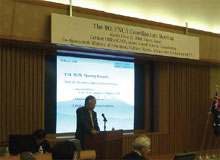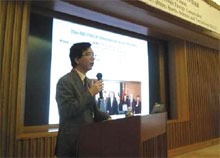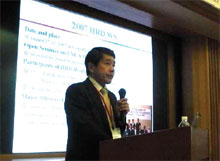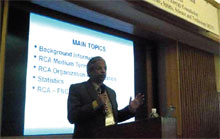Record of the 9th FNCA Coordinators Meeting
March 10 to 11, 2008,
Tokyo, Japan
The Ninth FNCA Coordinators Meeting (CM) was held from March 10 and 11, 2008, in Tokyo, Japan, hosted by the Atomic Energy Commission (AEC) of Japan and the Cabinet Office (CAO) of Japan.
The Meeting was attended by delegates from ten FNCA countries, i.e., Australia, Bangladesh, the People's Republic of China, Indonesia, Japan, the Republic of Korea, Malaysia, the Philippines, Thailand and Viet Nam. Dr. Prinath Dias, RCA Focal Person participated representing IAEA.

Opening Session
Dr. Shunsuke Kondo, Chairman, Atomic Energy Commission of Japan, gave the opening remarks at the Opening Session. He expressed warm welcome to all participants and spoke on important issues to be discussed at the meeting.
Dr. Sueo Machi, FNCA Coordinator of Japan, presented notes on the meeting agenda. Agenda was accepted with minor changes.
Session 1: Progress, Evaluation and Planning of FNCA Projects
The activities of on-going projects and their future plans were reported by the FNCA Project Leaders.
- Research Reactor Utilization -
Overview of the Research Reactor Projects was presented by Dr. Fumio Sakurai, Chairman, Steering Group of Utilization of Research Reactors.
1. Research Reactor Technology Project (RRT)
Dr. Kiyonobu Yamashita, Project Leader of Japan, presented the progress and achievements of the project. The Meeting noted the progress being made in the application of SRAC and MVP for core management of research reactors in using for RI production, neutron doping in silicone and coloring gemstones. The Meeting agreed that the next theme for the project should be on safety analysis. The proposal to extend the project for 3 year focusing the application of COOLOD and EUREKA for assurance of safety of research reactor was accepted. Following up of application of SRAC and MVP was requested by Dr. Cameron of Australia and agreed.
2. Neutron Activation Analysis (NAA)
Dr. Mitsuru Ebihara, Project Leader of Japan, made a presentation on the progress and environmental pollution monitoring using NAA. The Meeting agreed to change the focus of the project to the application of NAA for monitoring food contaminants for safety and exploration of mineral resources. Monitoring environmental pollution will be followed up to meet needs of some member countries. Comparative study of NAA with other analytical technique such as ICP-MS was suggested and agreed. It was also pointed out that NAA is important application of existing research reactors of member countries.
3. Following-up of Tc-99m generator production
Dr. Tsuguo Genka, Ex. Project Leader of Japan reported that Vietnam and Indonesia have plan to commercialize Tc-99m using PZC and Mo-99 produced by n-gamma reaction. The meeting suggested that FNCA should follow up these plans for commercial application in member countries. The issue of intellectual property rights (IPR) was raised by Indonesia. Meeting noted that the patent of PZC method is not registered in FNCA countries except Japan and Indonesia, therefore using the technology in FNCA countries is free.
- Application for Medical Care -
4. Cyclotron and PET in Medicine (PET)
Mr. Adnan Bin Haji Khalid, FNCA Coordinator of Malaysia and Dr. Keigo Endo, Project Leader of Japan, presented the status of the project. The Meeting noted the progress made in the 2nd workshop held in Kuala Lumpur, Malaysia. It was reported that the cost using PET can be reduced by introduction of system producing FDG by a central cyclotron facility to distribute FDG to hospitals. Malaysia encouraged Indonesia and Korea to participate in the workshop. Dr. Machi emphasized that the activities on diagnosis providing PET image atlas should be very useful for medical experts in member countries.
5. Radiation Oncology (RO)
Dr. Tsujii presented progress of the project in 2007, and Dr. Calaguas reported the results of the Workshop held in Manila in 2008. The meeting noted that tangible progress of the project in establishing the new protocols for treatment of uterine cervix cancer and nasopharyngeal cancer. Three years extension of the project for therapy and two years extension for QA/QC were accepted by the meeting. Dr. Machi suggested that member countries use ODA for provision of expensive radiation treatment facilities since most developing countries have serious shortage of treatment machines.
- Application for Agriculture -
6. Mutation Breeding (MB)
Dr. Hitoshi Nakagawa, Project Leader of Japan, reported the results of the 2007 Workshop held in Daejeon, Korea, and the outcomes of the sub-projects, (a) insect resistance in orchid and (b) disease resistant banana
The meeting agreed that the new sub-project on "Composition or Quality Improvement in Rice" will be major activity in years to come, orchid sub-project will be followed up by Malaysia with the support of Thailand till 2009, and banana sub-project will be terminated in 2008. Dr. Bhuiyan suggested to add improvement of productivity of rice in the new sub-project.
7. Biofertilizer
Dr. Tadashi Yokoyama, Project Leader of Japan, and Prof. Dr. Nantakorn Boonkerd reported the results of the 2007 BF Workshop held in Kuala Lumpur, Malaysia. Dr. Nantakorn pointed out the advantage of radiation sterilization of carrier over steam sterilization in terms of quality of inoculants. Meeting noted importance of biofertilizer for environmental protection by decreasing use of chemical fertilizer. Dr. Machi requested that coordinator should facilitate cooperation between nuclear institute and agriculture institute for use of irradiation of carriers for field tests and even commercial production of inoculants.
- Industrial Application -
8. Radiation Processing of Natural Polymers
Dr. Yoshii of Japan and Dr. Hien of Vietnam reported the progress of the project in 2007 with the collaboration with RCA. Dr. Hien and Dr. Machi reported that the workshop in 2007 requested the demonstration of radiation processing chitosan using large irradiation vessel of BATAN for engineering experience and sample preparation for field tests in member countries. Dr. Hanafiah welcomed the demonstration in BATAN. Dr. Dias stated that collaboration in this project area will benefit both RCA and FNCA.
9. Public Information of Nuclear Energy (PI)
Mr. Minoru Kubo, Project Leader of Japan, reported the results of the 2007 PI Project Leaders Meeting on PI for introduction of nuclear power. Extension of project for 3 years was approved. Opinion survey on nuclear power in member countries was proposed and accepted because of changing in the recognition of significance of nuclear power for mitigation of global warming and energy security. The meeting noted that preparation of questionnaire is important for appropriate survey. Korean delegation pointed out the importance of referring opinion survey made in Europe.
10. Human Resources Development (HRD)
Dr. Jun Sugimoto, Project Leader of Japan, presented a review of the activities of the HRD project and reported the results of the 2007 HRD Workshop held in Yogyakarta, Indonesia. The meeting suggested that HRD for nuclear power should be strengthened because some FNCA governments which have a plan to introduce nuclear power urgently need human resources for nuclear power. Japanese delegation mentioned that training for basic knowledge of nuclear power, such as nuclear physics, reactor physics and reactor engineering can be provided under ANTEP. Some delegates welcomed that countries like China and Korea to offer academic and training programs relevant to nuclear power technology.
11. Nuclear Safety Culture (NSC)
Dr. Ron Cameron, FNCA Coordinator of Australia, reviewed the current status and presented the action plan of the project for the coming years. On behalf of Dr. Tsutomu Yokoyama, Project Leader of Japan, Mr. Atsuo Kosaka, Nuclear Safety Technology Center, presented outcome of the project including the results of the peer review.
Dr. Cameron stated that future direction of NSC project will be decided depending on outcome of survey and recommendation of the workshop in March. The project should be planned to be complementary with ANSN. Dr. Cameron also mentioned that replacing NSC by new project on knowledge management in nuclear research facilities will be another option.
12. Radioactive Waste Management (RWM)
Prof. Toshiso Kosako, Project Leader of Japan, presented a review of the activities and accomplishments of the project. These include the RWM Workshop held in Bangkok, Thailand.
Proposal from the workshop to terminate the project of radioactive waste management and to initiate new project on radiation safety was discussed. It was pointed out that IAEA and RCA have implemented extensive program of radiation safety. The importance of improving waste management technology and facilities in member countries was noted by the meeting. It was agreed that the new project should continue waste management activities in connection with radiation safety.
Session 2: Review summary and plan for 2008
Dr. Machi reported summary of reviews for 6 projects, RRT, NAA, Radiation Oncology, HRD, PI and RWM which were evaluated for extension or termination. The meeting took note the summary report and approved the extension for 3 years (2008-2011). The proposal of RWM to start to activity on radiation safety needs to be reconsidered taking account the comments of the member countries. The project of Mutation breeding of disease resistant banana will be terminated in 2008 and sub-project on insect resistant orchid will be terminated in 2009.

Session 3: Report on the 8th FNCA Ministerial Level Meeting
Mr. Kuroki, Cabinet Office (CAO) of Japan, reported the summary of the 8th FNCA Ministerial Level Meeting (MM) held in Tokyo, Japan, on December 18, 2007 and also gave a leadoff speech about the follow-up "Forum for Nuclear Cooperation in Asia (FNCA) Joint Communiqué on the Peaceful Use of Nuclear Energy for Sustainable Development".
- The meeting agreed to share all information about the actions concerning the follow-up of the joint communiqué through the coordinators of each country. Japan, as the host country of the 8th FNCA Ministerial Level Meeting, will present the joint communiqué to the Secretary-General of UN, and the permanent missions of the signatory countries to the UN are invited to witness the presentation.
- Australian delegation suggested to make effort to increase the number of other countries which support the joint communique and to promote the discussion between the atomic energy related experts and environmental experts.
- The meeting agreed to allocate enough time for policy dialogue on the introduction of civilian nuclear energy in terms of "Reduction of CO2 emission and energy sustainability" at the 9th Ministerial Level Meeting.
- FNCA countries are expected to report the progress of implementation of the joint communiqué at the 9th Ministerial Level Meeting.
 Session 4 Session 4
1. Summary report and follow-up of the 1st meeting of Study Panel
Dr. Jun Sugimoto, chairman of the Panel Meeting, reported the summary and the follow-up of the 1st meeting of Study Panel, in which it had been recommended that information exchange on human resources development for the introduction of Nuclear Power Plant among the FNCA member countries should be enhanced. Based on this recommendation, the follow-up activity, concept of FNCA database and the schedule have been proposed. This meeting agreed the seven step approaches to designing and constructing the FNCA Database for HRD toward Nuclear Power. In addition, Chinese delegates mentioned that Chinese universities and nuclear R&D institutions would be happy to be involved in this HRD project.
2. Plan for the 2nd meeting of Study Panel
Mr. Kuroki proposed "Nuclear Safety" as the theme of the 2nd meeting and explained that in the 2nd Meeting of Study Panel, participants should review the result of the Study Panel and discuss the next step concerning nuclear energy. And Mr. Kuroki also explained the secretariat was planning to propose the "FNCA Nuclear Power Seminar" to promote information exchanges and experience sharing of technical and social infrastructure related nuclear energy. The meeting agreed to select "Nuclear Safety" as the theme of the 2nd meeting and also to discuss the next step concerning nuclear energy at the 2nd meeting. In discussion, some countries addressed about the importance of economic analysis and financing scheme.
 Session 5: Coordination and Collaboration with IAEA/RCA Session 5: Coordination and Collaboration with IAEA/RCA
Dr. Prinath Dias, IAEA Senior Program Management Officer and RCA Focal Person, presented RCA policy, highlights of achievement, and cooperation with FNCA. Dr. Machi presented the coordination and collaboration with RCA. Dr. Dias mentioned that RCA member states wish to continue collaboration with FNCA and the proposals made for enhancing the collaboration would be considered at the next RCA NRM. He proposed to exchange plans of activities of projects to increase possible cooperation. Dr. Cameron and delegation of Korea appreciated the effort of FNCA and RCA to strengthen cooperation and information exchange. The meeting agreed that the steps that had been taken were very important and further collaboration should be encouraged.
Session 6: Challenges of FNCA noted by the 8th MM
Dr. Sueo Machi gave an introductory talk about challenges of FNCA noted by the 8th MM.
According to the FNCA Vision Statement (accepted 2000), the FNCA is to be recognized as an effective mechanism for enhancing socioeconomic development through active regional partnership in the peaceful and safe utilization of nuclear technology.
The followings are 5 challenges of FNCA noted by the 8th MM.
- Linkage with Regional & National Priority
- Enhancing cooperation with potential end-users
- Ensuring sustainability of Financial Support
- Improving Coordination with Other Regional Activities to minimize duplication
- Need from FNCA countries for support in HRD for NPP introduction
Based on the 5 challenges, each delegation gave a speech about challenges and future direction of FNCA. The meeting agreed that member countries should think the FNCA challenges as the criteria to formulate and implement projects. The meeting also agreed that coordinators should carefully select workshop participants and strengthen linkage with potential end users of outcome of FNCA projects.
Closing Session
In the Closing Session, the Minutes of the Ninth CM were discussed and adopted by the delegates.
Dr. Machi gave the closing remarks, expressing his appreciation to all delegates for their excellent contribution. He stated that FNCA has achieved specific tangible results in each project which should benefit more to the member countries by further effort of FNCA Coordinators.
On behalf of the delegates, Dr. Somporn Chongkum thanked the Japanese government and Nuclear Safety Research Association for successfully hosting the meeting and expressed their appreciation for the excellent support for FNCA.
Finally Dr. Machi officially closed the Ninth CM.
|
